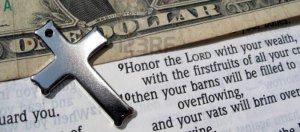In a recent symposium, Williamson outlined a series of questions, concerns and reflections about money and possessions. His paper begins with two points of context:
1. “To what extent is the OT position confirmed, modified, or completely changed by the teaching of the NT on the same subject?”
2.The biblical writers come from “diverse political and social circumstances” and wrote a “whole millenium” ago.
With these points in place, Williamson attempts to produce a fruitful analysis. He rightfully avoids “text-picking” (this might lead many, for example, to believe we should become “material-free medicants” or promote a “prosperity gospel”). It is better, as Willaimson argues, to explore from where the OT economy and the present day economy intersect or diverge. Williamson begins by saying, “I find it hard to escape the conclusion that for the most part the OT takes a top-down or hierarchical view of society rather than a bottom-up, democratic view” (3).

It might be difficult, therefore, to realize God’s position in such a sphere: the position of Creator and King. We do not immediately see that “when it comes to the material world…the underlying conviction is that it is all, without exception, the Lord’s inalienable possession and that he gives it to whom he will.” The OT is replete with such statements (Gen. 12:1-3; Lev. 25:23; Deut. 32:8; cf. 2:5, 9, 19; Jer. 27:1-7; Amos 9:7). God’s position is, rather, in control of this sphere.
Other examples build on Williamson’s framework. Interestingly, the Levites in Neh. 13:10-12 depended on the “general welfare” afforded them by the exilic community. Situations like these require kings that were appointed by God “to serve the needs of the nation at large” (cf. 1 Kgs. 8:62-66). After kingship came citizenship – the people addressed by Isaiah, for example, “take over the role among the nations” as a guarantor of justice (Is. 41:8-10; 42:1-9; 49:1-6). Possessions/wealth are intimately tied to purpose, and the notion of “dominion” over the earth may then take on a new look for present-day Christianity.

Another study, by Bob Belking, is obliquely related to Williamson’s article (“Drought, Hunger, and Redistribution: A Social Economic Reading of Nehemiah 5” in The Historian and the Bible: Essays in Honor of Lester Grabbe [New York: T&T Clark, 2010]). He shows that “rebuilding” Israel was not just about restoring the Temple and city walls, but promoting a “concept of social consciousness” (146). Nehemiah was concerned with poverty and “excessive difference in wealth,” not allowing such realities to be misunderstood (e.g. the result of “fate or human failure”).
Hopefully, these conclusions produce a new “instinct” for Christians. Too often we approach any discussion/debate on economics with a politically-charged toolbox – the approach is a reflex. However, a theological second-nature seems more appropriate for our purposes, especially as citizens of a divine economy.
Well written, great context and thoughtful. My study for this next week. Thank you.
Is this paper avaiable somewhere online?
Hi Caio,
I own a copy if you would like a PDF. Let me know.
I would love that. Please send it to my email – caiovintage@hotmail.com
Thanks a lot.
Hi there. Fascinating post. Could you kindly tell me more about the symposium as I can’t find it referenced anywhere? Best wishes Mime
Hi Mike,
I may have misspoke in using the word “symposium” –
It is in a collection of essays on the same theme with many notable authors. The main title escapes me but I can dig it up and get it to you – off the cuff, I want to say its in the latest Ex Auditu. Talk to you soon!
Hi Mike, did you receive my reply from earlier?